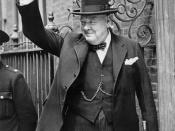Currency is a unit of exchange, which makes the transfer of goods and services possible. It is a form of money. Each country or region has a currency zone, which is where a specific currency is the main standard of exchange. To make trade between zones easier, exchange rates are created to set prices at which currencies can be exchanged against one another (http://en.wikipedia.org/).
The 'pound sterling' (ã) is the official currency of the United Kingdom, and the 'euro' ( ) is the official currency for twelve European Union member states: Austria, Belgium, Finland, France, Germany, Greece, Ireland, Italy, Luxembourg, the Netherlands, Portugal, and Spain (http://en.wikipedia.org/).
As a member of the European Union, the United Kingdom has the option of adopting the euro as its currency. By not adopting the euro as its currency, Britain has monopoly control over its own currency. As John Maynard Keynes put it, "He who controls the currency controls the country" (http://www.freebritain.co.uk/).
The twelve member countries of the European Monetary Union, that have accepted the euro, have ceded control of monetary policy to the European Central Bank, which means that they have no control of the currency (http://en.wikipedia.org/). The United Kingdom, along with Denmark, is unique to the European Union because it is an opt-out from entry to the euro. This means that every other EU nation, except for the United Kingdom and Denmark, must eventually sign up.
The United Kingdom is not the only member of the European Union that has not accepted the euro. Denmark and Sweden are two prime examples that show that not everyone wished to change to the euro. Sweden has indefinitely delayed converting to the euro by refusing to join the European exchange rate mechanism II. Denmark, nor the United Kingdom, will ever have to worry about...


